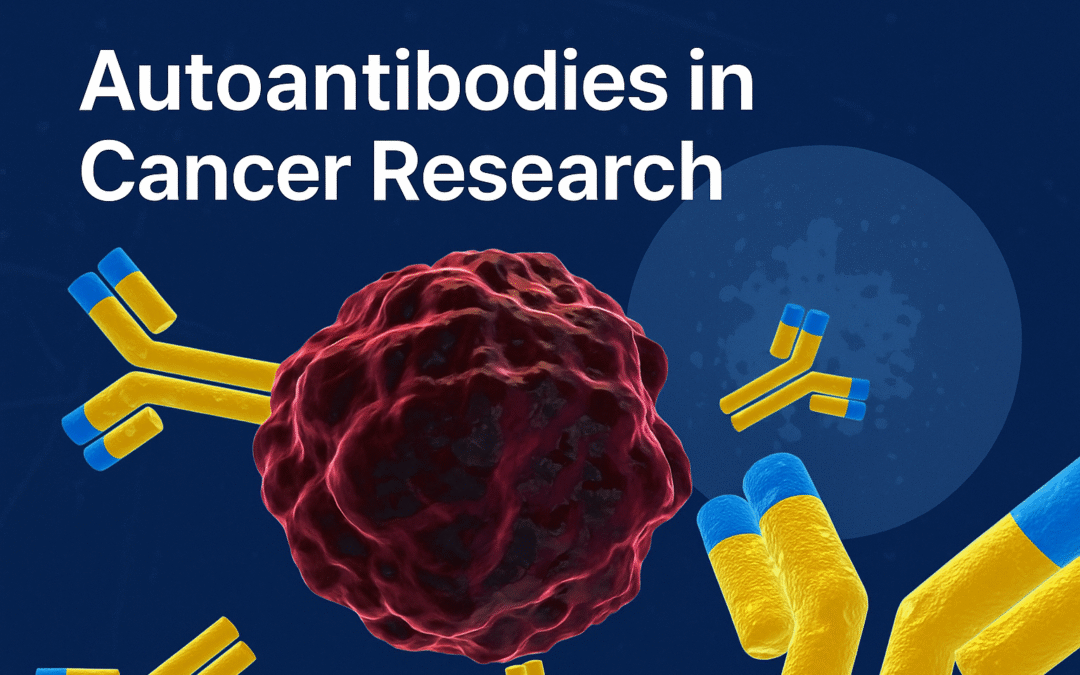Welcome to our newsletter, where we break down exciting advances in cancer research. In this issue, we’re taking a deeper dive into autoantibody profiling — an emerging tool for understanding and fighting cancer.
Why Do Autoantibodies Matter?
Your immune system protects you by attacking harmful invaders like bacteria and viruses. But sometimes, it could create proteins called autoantibodies that target your own tissues. Autoantibodies may be pathogenic, disease-specific and diagnostic, or of no apparent significance. Cancer cells can trigger autoantibody production long before symptoms appear. This makes autoantibodies powerful tools for early cancer detection, monitoring treatment success and identifying personalized therapies
How Autoantibodies are Changing Cancer Research
1. Autoantibodies can detect cancer before traditional methods like imaging or biopsies. For instance, researchers have identified autoantibody panels that signal early presence of different cancers before they are detected by traditional methods (Front Immunol. 2024; 15: 1455602; Thorac Cancer. 2024 Jun; 15(17): 1350–1356; J Immunother Cancer. 2024; 12(6): e009215; Technol Cancer Res Treat. 2024; 23: 15330338241293490.
2. Different cancers trigger unique autoantibody patterns. These “signatures” help predict how aggressive a tumor might be or how a patient will respond to treatment.
3. Autoantibody research helps identify new ways to treat cancer. Some autoantibodies even act as markers to track the success of therapies like immunotherapy.
4. Autoantibody profiling allows for treatments tailored to a patient’s unique biology. This could lead to more effective care with fewer side effects.
Latest Innovations in Profiling
1. Cutting-edge tools like protein microarrays and machine learning make it possible to study thousands of autoantibodies at once. These technologies are boosting the speed and accuracy of cancer diagnostics.
2. Researchers recently developed a blood test that uses autoantibodies to detect early-stage lung cancer with over 90% accuracy. A panel of autoantibodies is being tested to improve breast cancer screenings for women with dense breast tissue, where traditional mammograms are less effective.
3. Autoantibody signatures are being used to predict which patients will respond best to emerging cancer immunotherapies, enabling more precise treatments.
The Road Ahead
Despite exciting progress, many challenges remain, such as:
1. Ensuring consistent testing methods across laboratories
2. Understanding autoantibodies associated with different cancers. Different cancers and patients produce unique autoantibodies.
3. Ability to conduct large trials to prove these methods are ready for widespread use.
Opportunities for Collaboration
Organizations such as ITSI-Biosciences (www.itsibio.com) offer products for autoantibody profiling, and can also provide autoantibody screening services. Visit their websites to take advantage of their expertise.
Are you working on autoantibody research or seeking expertise in biomarker discovery? Let’s connect! Our team is eager to collaborate on advancing autoantibody profiling in complex disease research.
Download the full article here
The purpose is to provide information about available tools and services for Lifescience research. For questions/comments please send an email to Editor, ITSIBio News, itsi@itsibio.com.


